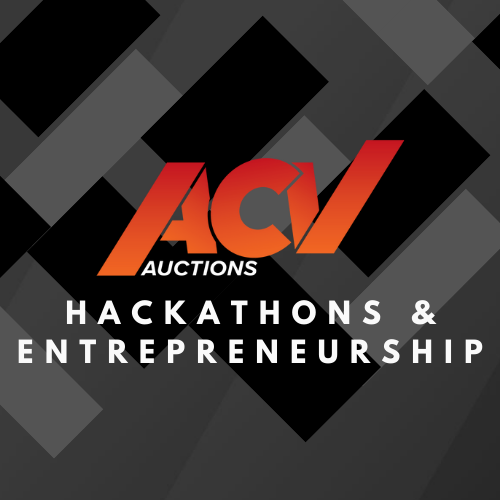I wanted to share my experience in my first hackathon here at ACV. I initially put a shorter version of this on LinkedIn. After my colleagues encouraged me to put this on the blog - I wrote this longer piece expanding on a few things.
Low Stakes, Fun Times
“Hackathons Are Great Low Pressure Exercises in Entrepreneurship”
This is the idea that popped into my head this morning when I was thinking about the most recent hackathon and the first one I participated in, here at ACV. I almost forgot how fun these were!
This idea that Hackathons being analogous to entrepreneurship is fitting. You go through the process of idea vetting (innovate), convincing folks of your idea (market), joining other colleagues (building a team) executing on the idea (building a product), and seeing if the market also thinks your idea is a good one. All of this done on your own if you were trying to create your own business is stressful, and on a much longer timeline. But in the context of an already successful business that has customers, you have a substantial problem set to work with.
You’re not starting from nothing, and you already have experience at this company to know what has worked and what hasn’t. This is a golden sweet spot where you can execute on something small in a tight feedback loop with folks you’ve already worked with, or already know the problem-space you want to hack on. chef’s kiss
A Little Preparation Goes a Long Way
I pre-planned a lot. More than I thought I would honestly. I had a particular idea I was interested in gathering around, so that kept me motivated to articulate it, and be prepared for some folks to collaborate with on this idea.
I gathered my team, and was putting out feelers for who might be interested in joining me. As soon as I had the first person join, I created our own Slack channel to get organized and discuss things. I created a Trello board brainstorming what tasks may look like, what I might have to do before the Hackathon if anything, and what we could possibly fit into three days, which is not a lot of time.
Setting up a few small tools like this, and ensuring that I could communicate during the hackathon with my potential hackathon teammates, put us much closer to success, especially when the hackathon is virtual. We were allowed to do things before the hackathon started, as long as we stated what those things were in our final presentation. At this point I didn’t have a team, or knew for certain that the initial idea I had would be the one I’d do in the hackathon.
But before final idea, I needed fellow hackers.
Team Formation
Once the first person showed he was interested in joining my team, whom I’d worked with before at a previous company. We pinged another person, who we both had worked with before. And then as day or two before the Hackathon started we discussed getting another person to fill a skills gap (experience with backends at ACV) who I’d worked with before at another company years before.
Using your network works, I knew these folks, I knew where their skillset was, whether it be UX, Product Management, ACV experience with backend programming, or Frontend engineering experience. The team gathered was well-rounded, I knew very skilled because I’d worked with all of them previously, we knew each other and therefore had a rapport , and our skills complimented one another.
The Idea
Once the team was formed, we brainstormed for at least one 45 minute session. As folks talked about what they might want to do, I typed in a Google Doc the different ideas we were coming up with.
We divided them into roughly how hard we think they would be, whether the customer of the idea would be internal colleagues or external customers, and if we think we could get it done in the time allotted- only 24hrs in total.
We finally settled on a smaller project, a Chrome extension that an internal user could install, backed by a C# API. The idea being that as a new employee to ACV you don’t know what you don’t know about processes, documentation, or websites you need to do your job, so this Chrome extension you could install, and it would be pre-populated with useful resources tagged by team, domain, or task. You could search for any of these in the search box, and it was all driven by keyboard shortcuts so it was fast to use.
Chrome extensions are not easy, but I think we all learned a lot building it.
The Presentation
The time was near on the final day, I loaded the server that ran the API that one teammate worked on, pulled in the styles another teammate worked on, and ran through the Chrome extension end-to-end. I was impressed! It looked great, worked how we thought it should, and keyboard shortcuts worked without much work in navigating search results. So far I felt excited and relieved that we had gotten a good version one out the door all together.
There were other ideas around AI/ML and more things we wanted to do, but I think we did well in tempering our expectations in what we could get in the allotted time.
As one teammate put together the Google Slides, I was running through how I’d present to the 200+ Zoom call participants this technical demo of the Chrome extension. I took a single piece of paper, and wrote down the rough outline of what I’d cover, how much we did, and showing it working, all while praying to the demo gods that there were no hiccups.
We presented, and it went without a hitch. There were many other great presentations of hackathon projects after ours. Some amazing videos, and a lot of laughs. Afterwards, all the hackathon participants voted and we finally got our result, third place! My team won an iPad, a gaming chair, an espresso machine, and an ultrawide gaming monitor.
Moar Hackathons Plz
Overall it was a great experience for me and my team. It was nice to try to execute like a startup in a small timeframe:
- Innovate - Have an idea that you think there is a need for it in the market you’ll serve
- Market - Be able to pitch this idea to your teammates to work with you, and then the customer
- Build a team - Gather teammates from your network, that you know and trust and skillset compliment each other
- Build a product - Execute on your idea and iterate quickly
Hackathons are a lot like building a startup in this way. Keep hacking!













